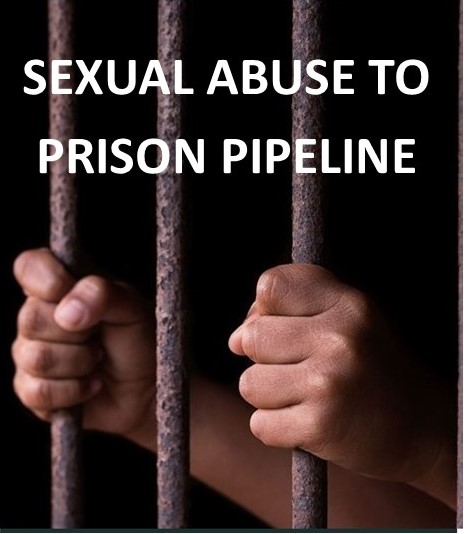Sexual Abuse to Prison Pipeline is a 3 Part Series – Click on links below to view each series
Many girls as well as boys who experience sexual abuse are routed into the juvenile justice system because of their victimization. Once inside, they encounter a system that is often ill-equipped to identify and treat the violence and trauma that lie at the root of the victimized youth’s arrests. More harmful still is the significant risk that the punitive environment will re-trigger their trauma and even subject them to new incidents of sexual victimization, which can exponentially compound the profound harms inflicted by the original abuse.
The African American sub commission along with LaResse Harvey, CT Hall of Change inductee 2020 Great 8, Founder of Civic Trust Public Lobbying Company, Co-Founder of Once Incarcerated, and Author of “Button’s Journey: My First Two Years Living with PTSD“, hosted a Series, “Sexual Abuse To Prison Pipeline“.
Parts 1 through 3 of the series were held between the months of September through December 2021 with expert keynote speakers and each session ending with a sound healing exercise by Kelvin Young, 2020 CT Hall of Change Inductee and Sound Healer.
The Swan Center for Advocacy & Research, a national organization in Georgia, honored LaResse Harvey and the Commission for raising awareness to improve the lives of survivors.
Part 1 “Sexual Abuse to Prison Pipeline Awareness” September 9, 2021
Nanee Sajeev, Justice-Involved Advocacy Coordinator of Connecticut Alliance to End Sexual Violence was the keynote speaker and presented on sexual violence and criminalized youth, what sexual violence is, the trauma to prison pipeline and how victimization creates pathways to crime, as many survivors are criminalized for the ways they experience and navigate trauma and survival.
Representative Patricia Dillon, Deputy Majority Leader of the CT House of Representatives, also serving on the Appropriations, Environment and Judiciary committees, addressed sexual abuse as among the most destructive of crimes, brutal and devastating and carrying the potential to haunt victims forever. Representative Dillon addressed the Prison Rape Elimination Act (PREA) which was passed to prohibit all forms of sexual abuse and sexual harassment in CT facilities, by staff as well as incarcerated colleagues.
Senator Winfield, Chief Deputy Majority Leader, Chair of Judiciary, Vice Chair of Energy & Technology, Member of Appropriations; Education; Housing; General Law engaged in the conversation regarding challenges youth face from sexual abuse and victimization.
Part 2 “Sexual Abuse to Prison Pipeline the Psychological Breakdown of Sexual Abuse, Violence, and Trauma”. October 14, 2021
Keynote speaker, Lisa Fontes, PhD, Senior Lecturer II at the University of Massachusetts Amherst and internationally known expert on child abuse, intimate partner violence, and sexual violence presented on how sexual abuse and violence can have psychological, emotional, and physical effects on a survivor, understanding childhood sexual abuse and violence and how children’s brains and bodies respond to the trauma of sexual abuse. As children mature, their trauma responses influence their relationship to the world including subsequent sexual encounters. Her presentation traced the developmental course of sexual trauma.
Richard Smith, Founder & Trainer of Richardsmithspeaks, LLC., nationally recognized expert on trauma and healing for survivors of interpersonal and systemic violence and lecturer on issues such as systemic racism, mass incarceration, and trauma and healing presented, “Punished for Being Wounded” on the ways that Black and Brown trauma is pathologized, criminalized, and penalized within the criminal legal system and ways that white supremacy, capitalism, and mass incarceration exploit Black and Brown pain.
Lindsay Rosenthal, Initiative Director of the Vera Institute’s Initiative to End Girls’ Incarceration addressed “Transforming Systems for Survivor Healing and Freedom” how system responses to trauma in the sexual abuse to prison pipeline replicate dynamics of power, control and isolation inherent in abuse, causing further harm.
Part 3 “Sexual Abuse to Prison Pipeline and Disabilities” December 1, 2021
Deborah Dorfman, Executive Director/Attorney of Disability Rights Connecticut (DRCT) was the keynote speaker and presented on “Sexual Abuse in the Disability Community“. Individuals with disabilities are often victims of sexual abuse and the problem continues to be inadequately addressed. Deborah discussed the prevalence of sexual abuse in the disability community and examined the barriers to advocacy for people with disabilities who have been sexually abused and addressed the remedies-including legal and other remedies available for people with disabilities who are victims of sexual abuse.
Cindy Prizio, Cofounder of One Standard of Justice, a CT civil rights advocacy group that advocates for trauma-informed restorative justice, addressed “Language Matters” addressing terminology and understanding as a baseline to healing and presented factual information on sexual disorders.
Annette Diaz, Advocate, Recovery Support Specialist, & Recovery Coach of Recovery Support Services shared “Resources and Supports” as well as coping strategies for survivors of sexual abuse, sex trafficking and sexual violence.
Kelvin Young, Community Health Worker at InterCommunity HealthCare, certified Sound Healer, inductee of CT Hall of Change and author of “Finding Freedom Behind Bars: A Journey of Self-Discovery & Healing” shared “Coping Mechanisms” sharing strategies people can use in the face of stress and/or trauma to help manage painful or difficult emotions. Coping mechanisms can help people adjust to stressful events while helping them maintain their emotional well-being.
The final part of the series “Policy Conversation and Recommendations” will be held in February 2022. The Commission will host a conversation to discuss policy and recommendations around supporting sexually abused children, men, and women in our state, especially those in the criminal justice system.


